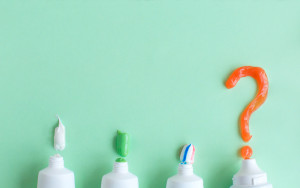Over the past decade, there has been a big push for more “natural” products to enter the market, along with the preference of organic foods and non-toxic cleaners in the home. Although science has made strides to prove that not all chemicals are “toxic,” there are still people who prefer to use products like toothpaste that don’t include ingredients that they deem toxic. However, there is no scientific proof to support the claims that “non-toxic” toothpaste is safer or more effective than that regular toothpaste you find on your grocery shelves that contains fluoride.
Now that internet shopping has opened so many new doors and exposed us to artisan products like charcoal and clay toothpaste, it can be hard to determine what is really best for your teeth. What’s important to know is that many of the “all natural” products that are being marketed online are making big promises with very simple ingredients. For example, some of these non-toxic formulas are made up of baking soda, salt, lemon juice, and some spices for flavor, but what is that really going to do to help you fight decay?
The reality is that these gluten, soy, and GMO-free toothpaste don’t really do a better job cleaning your teeth, and they certainly won’t live up to their claims of reducing inflammation, strengthening enamel, killing bacteria and viruses, or reducing plaque. Don’t take our word for it, these claims have been tested by scientists and dentist, and their findings have been published in the Journal of the American Dental Association. Before you assume that these tests were funded by the ADA, be assured, they are not. There is no agenda here, but they did uncover that the data backing up the claims of these “all natural’ toothpastes, is not sound and that there was no efficient evidence backing any of the claims that these brands made!
There have been many public battles waged over the safety of fluoride, but the studies and science behind the benefits of adding fluoride to drinking water will always trump unsubstantiated concerns against it. While there are drawbacks to children receiving too much fluoride at an early age causing fluorosis, a normal amount of fluoride in toothpaste and water is actually very beneficial in preventing cavities.
Damage Control
When it comes to keeping teeth healthy, the most important part is killing bacteria in the mouth as much as possible. The best way to do that is by brushing at least twice a day for at least two minutes each time. Don’t forget to floss! Bacteria love to hide in obscure and hard-to-reach areas where it can live and multiply, eventually causing tooth decay and result in cavities. This is where the important job of fluoride comes in, and where the benefits of baking soda fall off. Flouride’s main job is to strengthen enamel as it seeps inside the tooth, a process called remineralization. The all natural products containing charcoal and clay haven’t shown any of these abilities, thus making most of their claims completely false. However, if you want to maximize benefits, mix baking soda and fluoride rinses for best results.
Truth About Charcoal
While charcoal is being advertised as a great active ingredient to help your teeth, the truth is that charcoal is used to absorb chemicals. That’s right when someone has a bad case of food poisoning, doctors will immediately give them charcoal to help absorb the toxicity in their stomachs. That means the charcoal in this natural toothpaste can undo the helpful properties of your fluoride toothpaste! Not to mention, charcoal is much more abrasive for your tooth enamel than baking soda, potentially weakening your teeth and causing them harm.
While we’re on the subject of charcoal, let’s cover the other attractive-sounding ingredients that these non-toxic toothpaste boast like lemon and other abrasive substances. They all are horrible for your tooth enamel and can cause severe damage, especially an abrasive substance like citrus.
How to Avoid Bad Brands
Believe it or not, toothpaste aren’t as regulated as you’d think they are. The FDA doesn’t have any kind of control over what is sold as toothpaste in America. The ADA does test formulas for their general safety, and any brand with the ADA approval is a good and safe way to go. Other than fluoride, you should also be keen on buying toothpaste with other ingredients like stannous or potassium salts that can help with tooth sensitivity. These compounds can help numb nerves or clog tiny holes in teeth’s surface to help prevent any penetrating pain from daily brushings. If you find yourself dealing with tartar, which can lead to heavy decay, you need to think about going to see your dentist for deep cleaning to preserve your natural teeth. Sure, dentists can do all sorts of magic with implants and veneers to help correct major issues with rotted teeth, but isn’t it much easier to take care of those issues before that’s necessary?
Overall, “health marketing” has become a big trend over the past decade, scaring many consumers out of helpful common household products like toothpaste that could prevent major dental issues. Not all chemicals are toxic; in fact, there are chemicals all around us and in the foods and drinks we put in our bodies every day. Chemicals exist in nature, without any kind of human intervention, so don’t let the word ‘chemical’ become a scary word. Many of these holistic brands want to equate chemicals with being “toxic,” but it’s simply not true.
If you’re concerned about finding a brand that works best for you regarding toothpaste, consult with your dentist to find the best formula that will help your specific health concerns. Just remember, the most crucial part of your days are brushing and flossing your teeth thoroughly to make sure bacteria doesn’t take over and cause decay.
Sources:
https://www.businessinsider.com/best-natural-toothpaste
https://www.ncbi.nlm.nih.gov/pubmed/26293981
https://www.nidcr.nih.gov/health-info/fluoride/the-story-of-fluoridation
http://onlinelibrary.wiley.com/doi/10.1002/14651858.CD007868.pub2/full








Leave a Reply